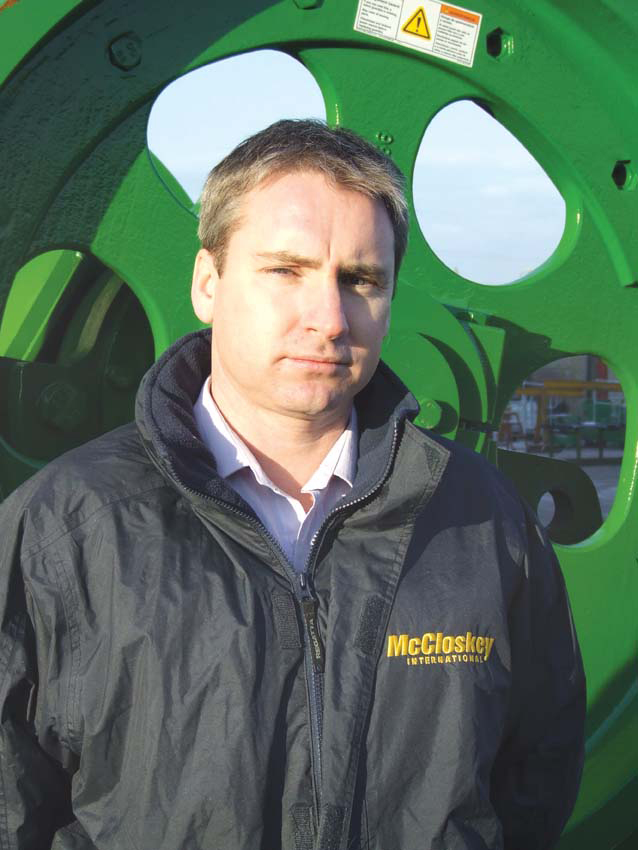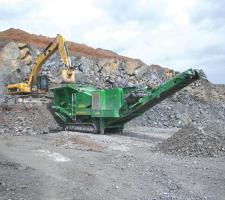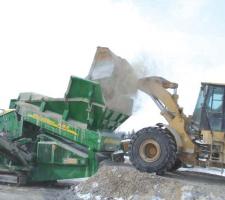
McCloskey is a relative newcomer to the European screening market and is now aiming to take on the crushing sector. Claire Symes met Seamus Doyle to find out more
Northern Ireland is home to global players in the crushing and screening sector, but one company located there hails from Canada rather than Gaelic origin.
The man charged with driving the company into Europe in 2004 was sales manager Seamus Doyle and today he is still actively working on widening McCloskey's market. It is this potential for expansion into new markets and the addition of crushing to the company's product line that gives Doyle his current confidence that growing the business is still possible this year despite the current economic climate.
"In recent years McCloskey has seen a year on year growth of around 20% globally and we expect further increases following on from the launch of our new crusher range," he said. "We have seen an impact from the credit crunch but we are pushing into new markets with expansion of our dealer network, which combined with the wider product offer, will deliver further growth." Today McCloskey's European operation is headquartered in the centre of Northern Ireland's crushing and screening region at Coalisland in County Tyrone. But the company's history started in Canada in 1985 when Pascal McCloskey opened a small manufacturing base in Ajax, Ontario to build stockpiling conveyors. Trommel screens were added to the product range the following year and in 1992, McCloskey launched a radial conveyor on a trommel.
Growth
"The business gradually grew and by 2000 McCloskey was the number one trommel manufacturer in North America with a 60% market share," said Doyle. Despite this growth, the company was almost unknown outside of North America at that time but, according to Doyle, there was a clear strategy behind this, "Paschal has always said that you should not move out of your own market until you have conquered it." But by 2004, the company was ready to branch out and acquired Viper in Northern Ireland with a double target of adding vibrating screens to the McCloskey range and entering the European market.
Paschal McCloskey recruited Northern Ireland-born Doyle from a Finlay dealer in New England, US to head up this new enterprise. "I had been working with McCloskey products during my five years with the Finlay dealer, so knew the market well. Paschal approached me to move back to Northern Ireland and help integrate McCloskey into the Viper products," he said.
Unfortunately, the promised transfer of Viper's design expertise and distribution network did not materialise, so Doyle was faced with the prospect of starting from scratch. "It was a challenge to introduce the brand and products to Europe," he said. "Nothing we do is completely revolutionary but we offer a combination of benefits, such as quality and end user focus, and it is this that has helped us gain a foothold in the market. Many of our dealers have said that as a company we are responsive to their suggestions, which has helped to win contracts." Today McCloskey has 43 dealers globally - 19 in Europe and another 18 in the US. Sales have also risen steadily from just over £2million in Europe in 2003 to £43million last year.
"Last year we sold 400 units, which is small compared to a company like
Although the company has a good network of dealers, Doyle is still working on expanding McCloskey's routes to market and still travels extensively to ensure he understands the business, particularly in growing markets. "Getting out and meeting a dealers' potential customers with them provides a level of comfort and support and can often help close a deal," he said.
Doyle revealed that his next targets for expanding the dealer network will be India, South Africa, Angola and Egypt. He described these areas as "emerging" and said he hopes to have dealers in place in some of these territories in the next few months.
New machines
Addition of the mobile crusher range to McCloskey's line-up is key to the company's expansion and Doyle said that the range was developed over a 14 month period to meet growing demand. "We haven't attempted to design our own crushing chambers but have built the machines around tried and tested
The new machines were unveiled to McCloskey dealers at a conference held in a quarry in Ireland late last year. According to Doyle, the crushing range was well received by the dealers and around 12 units have already been sold and are on site.
McCloskey had planned to expand its production facilities in Northern Ireland to support the addition of the crushing range to the operation but the new factory project has been placed on hold. Nonetheless, Doyle points out that this is not solely due to the current economic downturn in construction. "With the strengthening of the dollar and current drop in shipping costs, it made more financial sense to make use of unused production capacity that already exists in our Canadian facilities," he said.
Credit crisis
"Where we have seen the impact of the downturn is in our customer's ability to finance new machines. Before the dealer conference we had been working with GE Capital to provide our dealers with a branded financing facility but since the collapse of some leading banks late last year, we have not made any further progress with this.
"But it is not all doom and gloom - I believe that we will see a rebound in the first quarter of this year. The promise of extra government funding for infrastructure investment means that there will be a boost for the aggregates industry shortly as every one of these planned construction projects will need construction materials. But the governments will need to force the banks to restart lending if these investment plans are to be realised."















